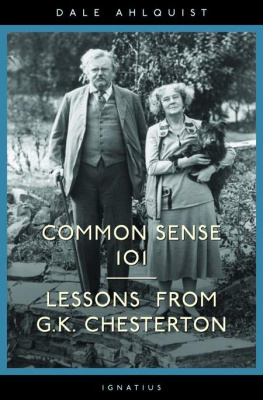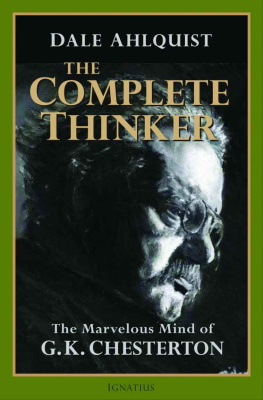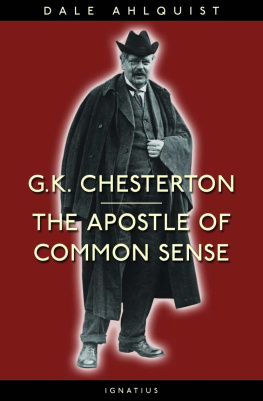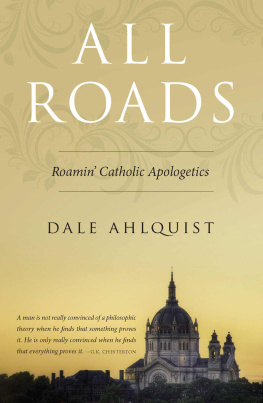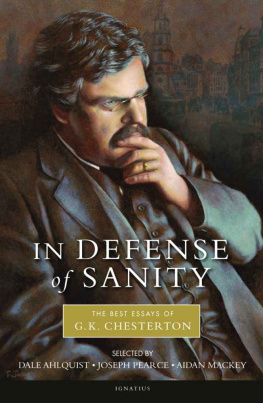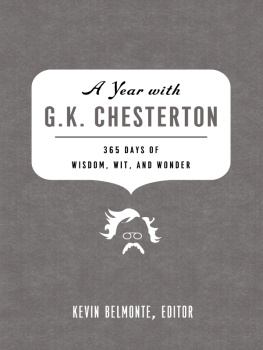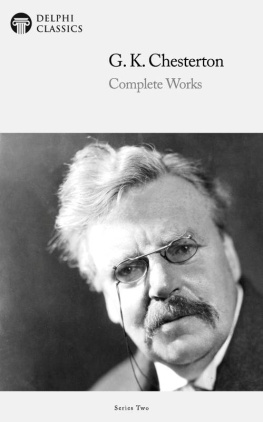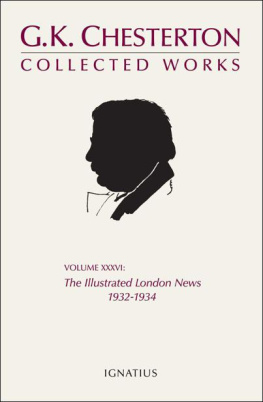COMMON SENSE 101
DALE AHLQUIST
COMMON SENSE 101
Lessons from G. K. Chesterton
IGNATIUS PRESS SAN FRANCISCO
Cover photograph: G. K. Chesterton and Frances Chesterton
Cover design by Roxanne Mei Lum
2006 Ignatius Press, San Francisco
All rights reserved
ISBN 978-1-58617-139-1
ISBN 1-58617-139-9
Library of Congress Control Number 2005933368
Printed in the United States of America
To John Peterson
Wise mentor and faithful friend
CONTENTS
PREFACE
How did the world forget such an unforgettable character? Most people know almost nothing about G. K. Chesterton. And most of what they do know is wrong.
Even those of us who have gotten to know him do not see the complete picture. We see only glimpses. We know that he was a writer from the early twentieth century who wrote a hundred books and thousands of essays for the London newspapers, that he wrote and argued about everything, that he penned epic poetry but also delighted in detective fiction, that he made everyone laugh, that everyone who knew him loved him, that he was happily married but unhappily had no children, that he took on all the leading thinkers of his time and challenged them not only with his clear ideas but with the example of his own life, especially with the astounding decision he made to become a Catholic.
But looking at Chesterton is not as important as looking at the whole world through his eyes. This is not a book about Chesterton. It is a book about everything else from a Chestertonian perspective. It is an attempt to get inside of him and inhabit him like a large house so that we can see the world through the windows he provides. I have very little hope of succeeding, but I am trying to do it this way for two reasons. First, it is precisely the way Chesterton approached other writers, by getting inside of them. Second, I cant think of a more wonderful way to see the world than through Chestertons eyes.
I have one great advantage: I dont have to make anything up. Chesterton wrote about everything. An ocean of words poured out of his pen. I have simply immersed myself in that ocean. It is deep, it is dangerous, it is delightful, it is refreshing, it is full of surprises, it is full of life.
These chapters first saw life in the form of television programs for the Eternal Word Television Network. I wish to thank Steve Beaumont and all the good folks at EWTN for inviting me into their studios and for helping me introduce Chesterton to so many people around the world. My further appreciation goes to Chuck Chalberg for trying to make himself look as though he weighs three hundred pounds. My undying thanks to Peter Floriani, whose hard work made my easy work possible. And my inexpressible gratitude to my toughest critic, without whom not one page of this book could have or would have been written: my lovely wife, Laura.
Another Introduction to G. K. Chesterton
When he walks in through the door, the first thing we notice is that he fills up the room. Of course, he weighs three hundred pounds, but his height is even more extraordinary than his weight. He is six foot four, but he seems even taller. He is a giant. But he is no Goliath. He is actually an overgrown elf. He casts a spell, and the spell is called joy. It is something we have certainly felt on some occasion, but this is something that sweeps into our souls. His huge body shakes with laughter. Laughter blows through his moustache.
I suppose I enjoy myself more than most other people, because theres such a lot of me having a good time.
He takes off his crumpled hat and his heavy cape. He leans his swordstick against the wall. He squints and adjusts the crooked lenses on the end of his nose, but they remain crooked still. There is geniality in his every gesture.
But what about that swordstick, is it real? Is there really a sword concealed inside the walking stick? There certainly is. Why does he carry a swordstick, of all things?
He says it is because he likes things that come to a point. He has a romantic attachment to the sword, seen in his endless doodles and drawings. But this sword will never draw blood. It is the poetry without the prose. The only thing he ever stabs with it is the pillow on the couch in his study.
But the sword is not the only weapon he carries. He also carries... a gun! But why?
I bought it the day of my wedding, he explains... and then adds, to defend my bride.
But wait, theres more in his arsenal. He also carries with him a big Texas knife. (Where does he keep all these things?) It is seven inches long when folded, fourteen inches long when open. The knife is only a short sword; and the pocket-knife is a secret sword. It has, he explains, that terrible tongue we call a blade.
He sleeps with the knife under his pillowand usually forgets it there. His wife has to retrieve it from all the hotels they stay at. He uses it mostly as a letter opener, and once during a debate, he absent-mindedly took it out and started sharpening his pencil with it, to the great amusement of the audience and the great distress of his opponent.
Yes, the many legends of his absent-mindedness are not exaggerations. He does miss a lot of trains. And the ones he does catch are not always the right ones. He will hail a cab to take him to the editorial offices of G. K.s Weekly, his own newspaper, but he will not know the address. So he will have the cab take him first to a newsstand to buy a copy of the paper so he can get the address, and since many of the newsstands are sold out of the paper, it may take several stops. He walks away from bookstalls reading a book he has picked up, and the shopkeeper, recognizing him, simply sends a bill to his wife. His pockets overflow with books and newspapers, and he reads as he walks, oblivious of traffic, which screeches to a halt as he crosses the street.
There is more in his pockets. In addition to the reading material and the weapons, he says he can find whole worlds in his pockets, that on the Day of Judgment when the sea gives up its dead, so will his pockets give up the extraordinary things buried there. But what he cannot find in any of his pockets is his train ticket. Or money. The train ticket he has no doubt left on the counter where he bought it. The money he has given to beggars.
He seems so frivolous and so careless, but he gives money to beggars, not frivolously or carelessly, but because he believes in giving money to beggars, and giving it to them where they stand. He says he knows perfectly well all the arguments against giving money to beggars. But he finds those to be precisely the arguments for giving money to them. If beggars are lazy or deceptive or wanting a drink, he knows only too well his own lack of motivation, his own dishonesty, his own thirst. He doesnt believe in scientific charity because that is too easy, as easy as writing a check. He believes in promiscuous charity because that is really difficult. It means the most dark and terrible of all human actionstalking to a man. In fact, I know of nothing more difficult than really talking to the poor men we meet.
And suddenly he does not seem so absent-minded and out of touch. His absent-mindedness, it turns out, is only about details that really dont matter, though they are the kinds of things that fill up the lives of most of us while we neglect the things that do matter. He is always focused on the larger picture and on eternal truths. But he also has a passion for justice and a genuine love for everyone. He may be lost and helpless on the street, but he is always at home in the world.
He can expound, it seems, on any subject. The history of glass-making. Gargoyles. Milton. Huxley. Cheese. The Manichees. Shakespeare. Shaw. Shirts. Tennyson. Turnpikes. Taffy. He can quote whole passages of books from memory, books that he has read years and years before. Challenge him to offer evidence for one of his historical pronouncements, he will repeat verbatim the terms of the Magna Carta, in the original Old English! Ask him to autograph a book for you, and he will inscribe it with an original poem inside the front cover:

